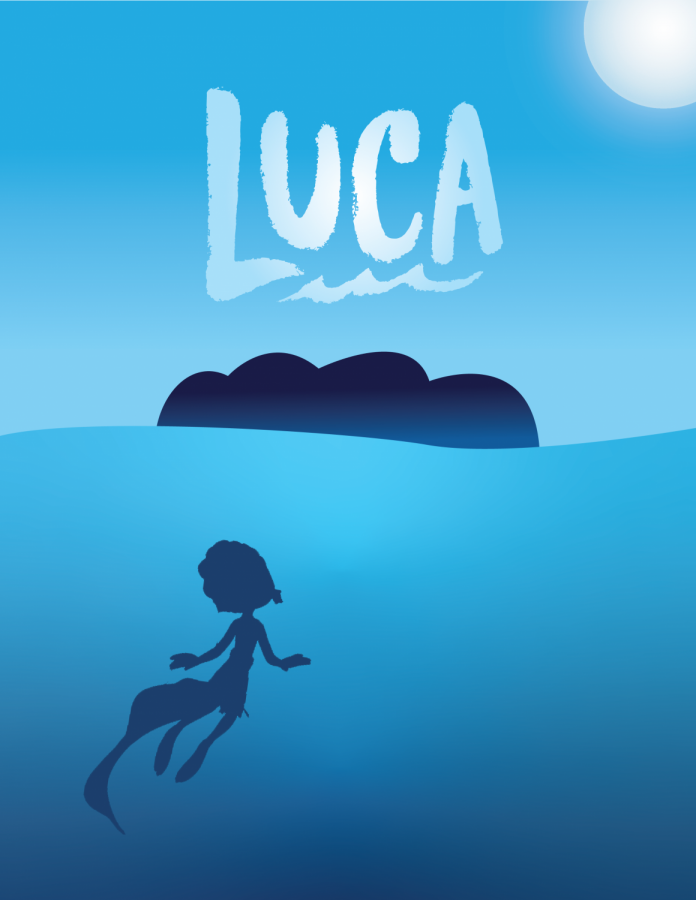“We can’t let him stay in this world – can we?”
This question lies at the crux of “Luca,” Disney-Pixar’s newest movie and director Enrico Casarosa’s first feature film. A highly anticipated 2021 film release and phenomenally charming queer allegory, “Luca” follows a young mermaid as he ventures into the sparkling human world above the Italian Riviera. The movie takes its titular character on a rollercoaster of discovery and growth, leading audiences through his tumultuous summer with stunning visuals, an excellent soundtrack, and lovable characters one can’t help but root for. Warning: spoilers ahead.
One of the most beautiful parts of “Luca” is introduced right away; 3D animation, although used more commonly now than ever, is rarely as breathtaking as it is in Casarosa’s film. Italy is hardly a difficult thing to make beautiful, but the artistic team behind Luca certainly outdid themselves. Fans of Casarosa’s work will also notice a few visuals from his other directorial credit, “La Luna” have found somewhat of a second home in the ocean waves and sun-bright sky of “Luca.” The film also boasts a distinctly Italian soundtrack, and includes pieces from famous Italian operas such as “Gianni Schicchi,” and “The Barber of Seville.”
As for the characters — each travels their own distinct journey. The movie begins by introducing the protagonist, Luca, and his complicated relationship with the human world. Equal parts curious and terrified, Luca slowly starts to venture into the human world at the behest of his new, mysterious friend Alberto, and in direct defiance of his family’s wishes. When Luca’s parents make preparations to send him away from their home and the human world, he and Alberto run away to Portorosso. Their arrival in Portorosso, the nearby human town, sees them make friends with the fisherman’s daughter, Giulia, who quickly takes the pair under her wing. With Giulia’s help, the trio enters the triathlon-style Portorosso Cup. For Giulia, winning the race means beating Ercole, her long-time bully and the reigning champion of the Portorosso Cup. For Luca and Alberto, the prize money means freedom in the form of a Vespa.
Early in the movie, when Luca first visits Alberto’s ramshackle tower of a home, the duo admire a poster on the wall which depicts a Vespa and, to the side, reads, “Vespa è libertà.” Vespa is freedom.
To Luca, this is intellectual and physical freedom — the ability to learn what he wants and go where curiosity takes him. For Alberto, this is freedom from his problems and from the memory of his father, whose days in absence are tallied on the wall beneath that same poster.
The metaphor is quite clear.
“Luca” is filled with complex themes like this, from Alberto’s denial of his own abandonment to the very thinly veiled allegory for homophobia that is Portorosso — a picturesque town which crudely caricatures, yet profits off and hunts, “sea monsters.” The film’s two protagonists, Luca and Alberto, are similarly incredibly layered.
While Luca’s journey is about expanding his worldview and learning to trust himself, Alberto spends the movie becoming intimately familiar with the meaning of the phrase, “if you love something, set it free.” Abandoned by his father months before the start of the film, Alberto latches onto Luca almost immediately, easily becomes jealous of Luca’s burgeoning friendship with Giulia and nearly ruins his relationship with Luca by clinging to his friend, morphing his desire for freedom into a toxic obsession with control.
The climax of Alberto’s character arc comes at the very end of the movie when he uses the money the trio won from the Portorosso Cup to surprise Luca with a ticket to Genova, where Giulia attends school. Alberto faces his ultimate fear, abandonment, and stays behind with Giulia’s father, Massimo, in Portorosso. The money – which was originally intended for a Vespa – now finances a different and more tangible form of freedom.
After their triumph at the Portorosso Cup, Luca’s mother poses a question to his grandmother: Can they allow him to remain in the human world? His grandmother’s answer: “Some people – they’ll never accept him. But some will. And he seems to know how to find the good ones.”
“Luca” is an animated film unlike any other produced in recent years, and is hopefully emblematic of what audiences can expect in the future – honesty, vulnerability, and the slow, steady push of boundaries that can only come from a societal powerhouse like The Walt Disney Company. Luca’s story is one familiar to many college students: he wants to leave the comfort of his home and meet the uncertainty that lies beyond no matter the cost. Similar to Luca, this desire is muddy at best and difficult to fulfill, but rewarding nonetheless.
“Luca”, which came out in mid-June, is certainly a timely rewatch for Aztecs as we open the fall semester. In the same way, this new school year promises uncertainty, new beginnings and potential above all else.








